Lindsey Buckingham Interview: Stevie Nicks, Mick Fleetwood and Songwriting
by Best Classic Bands Staff It’s been years since the surprising news that Fleetwood Mac had parted ways with Lindsey Buckingham. After that April 9, 2018 announcement, Buckingham did a solo tour while his former bandmates did an extensive tour of their own, augmented by new recruits Mike Campbell and Neil Finn. Then on Feb. 9, 2019, it was revealed that Buckingham had suffered vocal cord damage as a result of open heart surgery. He has since recovered and was even planning to return to the road in 2020, but the pandemic postponed that. He resumed touring in 2022. In a 2021 interview with Nile Rodgers for Apple Music 1, Buckingham talked about some of the classic songs he wrote for the band, his former relationship with Stevie Nicks, and his admiration for Mick Fleetwood.
It’s been years since the surprising news that Fleetwood Mac had parted ways with Lindsey Buckingham. After that April 9, 2018 announcement, Buckingham did a solo tour while his former bandmates did an extensive tour of their own, augmented by new recruits Mike Campbell and Neil Finn. Then on Feb. 9, 2019, it was revealed that Buckingham had suffered vocal cord damage as a result of open heart surgery. He has since recovered and was even planning to return to the road in 2020, but the pandemic postponed that. He resumed touring in 2022. In a 2021 interview with Nile Rodgers for Apple Music 1, Buckingham talked about some of the classic songs he wrote for the band, his former relationship with Stevie Nicks, and his admiration for Mick Fleetwood.
Buckingham, born October 3, 1949, shared those thoughts on an episode of “Deep Hidden Meaning Radio.” [You can watch the entire interview, released on May 8, 2021, below.]
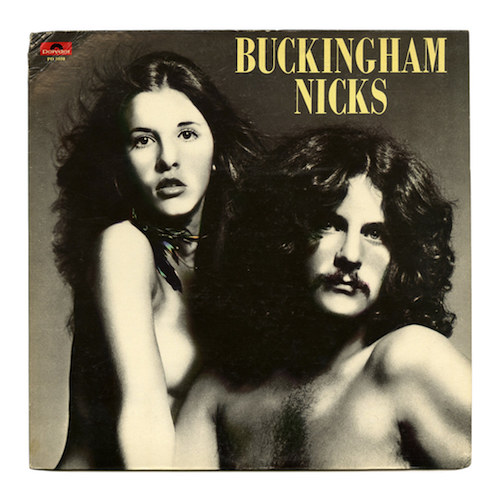 Buckingham was asked about the song “Monday Morning” which appeared on 1975’s Fleetwood Mac. “It was very interesting because Stevie and I had done the Buckingham Nicks album,” he said. “And in the meantime we’d been writing material for a second album, even though we didn’t have a [record] deal anymore. And we didn’t know where it was going to go. And ‘Monday Morning’ was one of those songs.
Buckingham was asked about the song “Monday Morning” which appeared on 1975’s Fleetwood Mac. “It was very interesting because Stevie and I had done the Buckingham Nicks album,” he said. “And in the meantime we’d been writing material for a second album, even though we didn’t have a [record] deal anymore. And we didn’t know where it was going to go. And ‘Monday Morning’ was one of those songs.
“All of the material that ended up on [our first album with Fleetwood Mac] had been demo’ed before meeting with Fleetwood, before that fortuitous occasion, when I ran into him at Sound City. ‘Monday Morning’ was very reflective of the early dynamic that was later to become a hallmark of Fleetwood Mac, which was couples breaking up, the angst of having to push forward.
“Stevie and I, through our struggles with Buckingham Nicks, had had personal problems and had broken up and gotten back together and she was being a bit fickle about things. And the song really was just addressing the fact that maybe on Monday everything was great, but by Friday things weren’t so great. As can be the case with relationships in general.
“It’s the opening track of [that] Fleetwood Mac album. And it really does sort of herald what became one of the big attractions of the band, which was the fact that we were this living soap opera, musical soap opera, that managed to push through to follow our destiny. And that was the very beginning.”
“Sometimes people don’t understand the dynamics of bands,” said Rodgers. “Like you said, man, it’s a living soap opera.”
“After 43 years,” replied Buckingham, “I still don’t understand it, but that’s okay.”
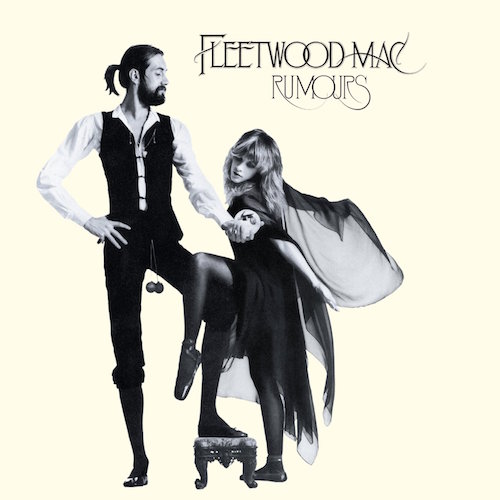 Of “Go Your Own Way” from 1977’s Rumours, Buckingham said, “That was interesting because that’s sort of Act Two, we had joined the band and Stevie and I are basically history, but still there’s some residue leftover and we’re still writing songs about each other a couple of years later.
Of “Go Your Own Way” from 1977’s Rumours, Buckingham said, “That was interesting because that’s sort of Act Two, we had joined the band and Stevie and I are basically history, but still there’s some residue leftover and we’re still writing songs about each other a couple of years later.
“Musically, ‘Go Your Own Way’ was just very, very interesting on a lot of levels because of the timing of the parts in there. We had cut it as a basic eighth note kind of chunk, chunk, chunk, chunk guitar. Then Mick had added… I’d really actually wanted Mick to play the pattern from ‘Street Fighting Man’ that Charlie Watts plays, [imitates drum beat]. He had to sort of do it his own way and he left out some beats and it became more syncopated and a little bit harder to sort of follow in a way until the chorus kicked in. And then that led me to add this sort of back rhythm guitar part, which in some ways was even made the first verse even more disorienting in terms of finding the beat.”
Buckingham then shared a story about the first time he heard the song on the radio when it had just come out as a single. “I was in my car and I was listening to [KMET in Los Angeles]. The famous DJ, B. Mitchel Reed, was on. He said, ‘Well, we got the new one from Fleetwood Mac. It’s called ‘Go Your Own Way,’ and he played it and it sounded great on the radio. Then it was over and he came back on and there was a pause, and he says, ‘That was Fleetwood Mac, ‘Go Your Own Way.’ Pause. ‘I’m not sure about that one.’
“Me being the ballsy person that I was back then, and I suppose still am, somehow I got the number of the station and I called him up and he, to his credit, got on the phone with me. I said, ‘B., what do you mean? What don’t you like about ‘Go Your Own Way?’ He says, ‘Well, I can’t find the beat’.”
Rumours was #1 for 31 weeks and has sold more than 40 million copies.
Related: As a result, only 5 albums reached #1 in the U.S. in 1977
The band’s follow-up was the ambitious two-LP release, Tusk. “You sell that many albums,” said Buckingham, “and you get to the point where the success becomes as much about the success as anything else. And I think there were many external influences that began to sort of loom, some subtly, some not so subtly, around us to make something like ‘Rumours 2,’ and you do find yourself in a position of possibly beginning to forget why you got into the business in the first place and beginning to forget who you are aspiring to be as an artist.
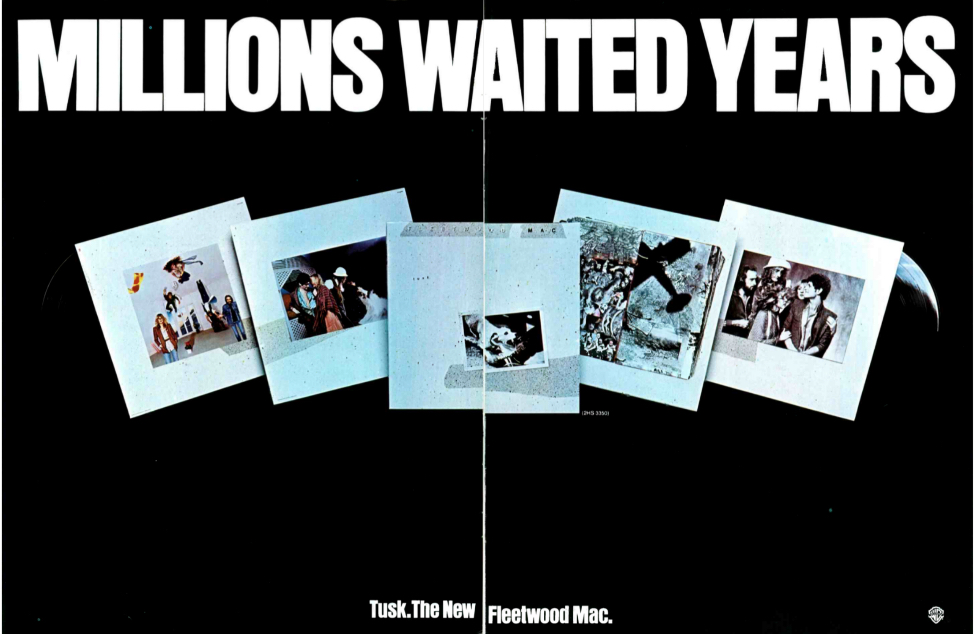
A two-page ad for the album ran in the Oct. 27, 1979, issue of Record World
“So Tusk, as an album, was made in counterpoint to all of that. And I’ve always said, I would have loved to have been like a fly on the wall the first time Warners sat down in the boardroom and put the whole album on, because I’m sure it just scared them to death. It did confound a lot of people’s expectations, but in many ways it was the smartest thing I ever did. And ‘Tusk,’ as a song, was really kind of the centerpiece of that sense of things, that way of thinking about what we should be doing, even at the risk of perhaps doing less commerce.
“[It was] something that would, again, confound anyone’s expectations as a first single, as a follow-up to any of the other singles on Rumours. The idea for the marching band was actually Mick Fleetwood’s idea. Where he came up with that I don’t know, but Mick is someone who I’ve learned a lot from over the years. He’s a total raw talent. When he drums, he’s one of the great drummers, but he has no idea what he’s doing. It’s all heart, it’s all coming from intuition.
“It’s not from a sense of being taught, and that same thing applies to his overview of music. And occasionally he’ll come up with just a brilliant idea to augment something. And ‘Tusk’ may be at the top of that list, in terms of finishing that song off exactly as it should have been.”
“So the drummer and the guitar player are the two guys who were really down, or at least that’s what it felt like to me,” said Rodgers.
“Oh yeah, we’re definitely kindred spirits,” said Buckingham. “And because I don’t read music and I never had a lesson in my life and it was kind of the same thing. I mean, obviously, in a more sort of articulated way what I do, but his intuition for what feels right and what is truthful, is just beyond reproach, and he and I have always shared that bond. I think in many ways you are correct that he and I were kind of the spine of what held Fleetwood Mac together in that way.”
Rodgers took a moment to praise Buckingham’s guitar playing.
“Thank you so much. What I’ve always tried to do is use the guitar in the most orchestral context possible, and to really think in terms of what is best for the song. And the guitarists who have always engaged me the most have been ones who have thought about that bigger picture and tried to enhance and really make choices creatively in service of the record, in service of the production, in service of the song. And quite often, that gets noticed much less because people just take it as part of the grain of what’s going on.”
“’Big Love’ became on stage a real signature piece that was reinterpreted for a single guitar. The song originally… was about isolation, and it was about the fact that I was living up in Bel Air at the time in this house on a hill, with a view of downtown, and I had my studio there, and I was all set to go. But I was also not attached at that time. And so the chorus [is] basically saying, looking out for love. But it doesn’t say that I’m looking for love. You know?
“I’m more sort of looking out for myself that I don’t want something to sort of cross my path, which is going to trip me up. And again, I guess you could say the spectre of Stevie is in there somewhere. In terms of, some of the hurt and some of the defense mechanisms that can kick in, especially when you’ve had to be in a band with someone for so long.
“And really, again, that was part of the deal with Stevie and me was that we had to spend an awful lot of time together without ever having gotten closure from each other. Most people, when they break up, they don’t see each other for a long time or maybe ever again. But you’re not constantly having to not only see someone but, in my case, make the choice to do right for someone when I didn’t always feel that I wanted to, you know?
“In order to take a song of hers, like ‘Dreams,’ which needed so much construction around it to take those same two chords and make them evolve from section A to section B to section C. And the love and the choice to do the right thing and to have the integrity to do that. It comes at a price sometimes, you know? It comes at the price of having your defenses come up, and sometimes over a period of time, it’s hard to get those down. So I think ‘Big Love’ was really about someone who was functioning quite well in his professional world but had become quite guarded emotionally, had an emotional moat around him, say, in his personal life.”
Watch Rodgers’ full interview with Buckingham on Apple Music 1
Buckingham’s early solo albums were released in 2024 on CD in the U.S. here and in the U.K. here.




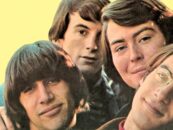
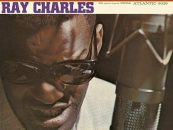

No Comments so far
Jump into a conversationNo Comments Yet!
You can be the one to start a conversation.